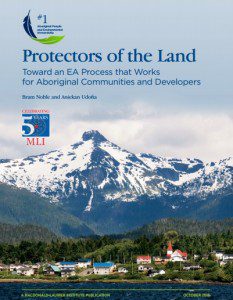 MLI author Bram Noble welcomes Prime Minister-designate Justin Trudeau’s pledge to review the environmental assessment process – the means by which major industry projects receive government approval.
MLI author Bram Noble welcomes Prime Minister-designate Justin Trudeau’s pledge to review the environmental assessment process – the means by which major industry projects receive government approval.
But, he says, this review will be incomplete if it fails to give Aboriginal groups the tools they need to fully participate.
Noble is the co-author of the recently-released MLI paper “Protectors of the Land”.
By Bram Noble, Oct. 28, 2015
During his election campaign, Justin Trudeau promised to make environmental assessments credible again. He committed to a new, fair environmental assessment (EA) process that will, among other things, respect the rights of those most affected, such as Indigenous communities, and provide ways for Canadians to express their views.
This commitment is welcome. Canadians have been hearing a lot about EA lately, as heated debates continue over major resource projects and their effects on both the ecosystem and on Aboriginal communities. Most people are at least passingly familiar with the epic review process for the proposed Enbridge Northern Gateway project, for example. Yet while the profile of the EA process is growing, so is dissatisfaction with the process and confusion about what it is intended to achieve.
EA is not intended as a forum for airing grievances about a particular resource industry such as the Oil Sands, or engaging in a broad-based debate on Aboriginal rights. It is a process at the federal or provincial level, conducted either by the responsible government authority or a review board, intended to identify and evaluate the potential environmental and social impacts of a particular proposed development, and find ways to mitigate them. What is becoming increasingly clear, however, is that the EA process is not currently serving the needs of Aboriginal communities or project proponents.
Trudeau’s commitment is to undertake, in full partnership and consultation with First Nations, Inuit, and the Métis Nation, a review of EA laws, policies, and operational practices. This review must address two critical issues.
First, Aboriginal communities are frequently consulted too late in the game, often when the project’s design and planning are already complete, and their concerns are not taken into consideration. This is creating conflict and unnecessary delay. The Assembly of First Nations has noted that minimizing the role of First Nations in EA leads “not only to an adversarial environment, but one marked by increased litigation”.
What is becoming increasingly clear, however, is that the EA process is not currently serving the needs of Aboriginal communities or project proponents.
Second, Aboriginal communities frequently lack the resources to analyse and respond to complex proposals, and many are dealing with several requests at once, resulting in inadequate engagement, participant fatigue, or both. For example, in Spectra Energy’s 2014 EA application for the Westcoast Connector Gas Transmission Project, 17 of the 24 potentially affected First Nations indicated that they lacked the financial, organizational, and technical resources needed to effectively participate in the EA process.
 Trudeau also notes that resource-based projects can create jobs and spur investments, and that decisions about project applications must serve the public’s interest. Yet the President and CEO of the Canadian Chamber of Commerce has described the Canadian federal environmental regulatory system as “cumbersome” and “one of the top 10 barriers to Canadian competitiveness”. Businesses also frequently find that the EA process is prolonged and combative, and in the end often does not forestall Aboriginal opposition.
Trudeau also notes that resource-based projects can create jobs and spur investments, and that decisions about project applications must serve the public’s interest. Yet the President and CEO of the Canadian Chamber of Commerce has described the Canadian federal environmental regulatory system as “cumbersome” and “one of the top 10 barriers to Canadian competitiveness”. Businesses also frequently find that the EA process is prolonged and combative, and in the end often does not forestall Aboriginal opposition.
How can environmental assessment work better for everyone? Governments and industry must invest resources in EA training programs to build educational and technical capacity in Aboriginal communities, and participant funding programs must be complemented by longer-term industry investments in Aboriginal engagement post project approval.
EA legislation should require more front-end, and culturally appropriate, engagement on behalf of the project proponent – at a point where decisions are being made about the intent to develop, and about the nature, rationale for, and intended design of a project (an excellent example of how this can work was the voluntary, cooperative approach to a 2004 federal-provincial EA process for a sand and gravel mine by Polaris Minerals and the ‘Namgis First Nation on Northern Vancouver Island). Where applicable, the terms of reference for an EA should be developed in collaboration with the potentially affected communities.
Meaningful engagement of Aboriginal communities is unlikely to threaten the efficiency of environmental assessment. However, poor engagement or lack of engagement will invariably cause delays and add costs to projects. The stakes are high. Major resource developments are at risk, and so are the relationships between governments, industries, and Aboriginal communities.
Bram Noble is a professor of environmental assessment at the University of Saskatchewan and the co-author of the Macdonald-Laurier Institute paper titled Protectors of the Land: Toward an EA Process that Works for Aboriginal Communities and Developers.




